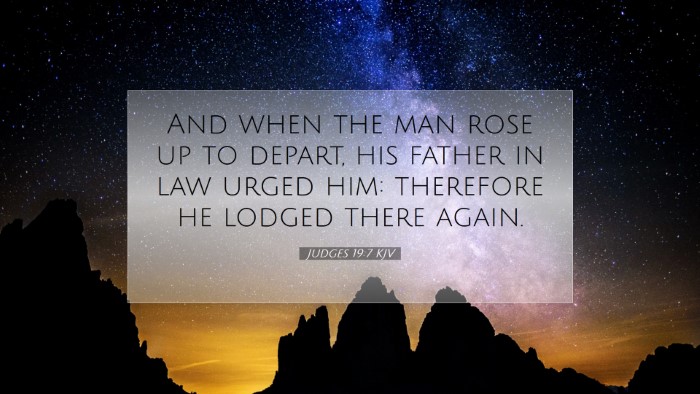Commentary on Judges 19:7
Judges 19:7 recounts a key moment in the narrative of the Levite and his concubine, a passage that reveals the moral decay present in Israel during the time of the judges. This commentary synthesizes insights from several public domain sources to provide a deeper understanding of this verse.
Contextual Overview
This verse falls within a larger story that exemplifies the social and spiritual turmoil in Israel, leading to events that foreshadow significant consequences for the nation. The backdrop is important as it illuminates the need for strong leadership, divine justice, and the consequences of straying from God's ways.
Verse Analysis
Judges 19:7: "And when the man rose up to depart, his father-in-law urged him: 'Stay with us a little longer; refresh your heart,' and then afterward you may go."
Matthew Henry's Commentary
Matthew Henry emphasizes the hospitality shown by the Levite's father-in-law, highlighting that the preservation of such warmth and kindness was crucial in a time of pervasive moral decline. He notes that the father-in-law's desire for the Levite to remain reflects the relational fabric that was essential for survival amidst societal chaos. Henry also underscores the spiritual implications of refreshment through fellowship, suggesting that in trying times, drawing strength from community should not be underestimated.
Albert Barnes' Notes
Albert Barnes provides a contrast between the Levite's journey and the sociocultural atmosphere of Israel. He points out that the Levite's reluctance to leave after being urged to stay emphasizes the value of communal bonds and the necessity of recuperation. Barnes notes the significance of the phrase "refresh your heart," indicating that the Levite needed both physical and emotional sustenance before embarking on his journey into a landscape marked by violence and lawlessness. This invitation represents a deeper spiritual truth about the necessity of finding refuge in close relationships and shared faith.
Adam Clarke's Commentary
Adam Clarke offers a closer look at the implications of hospitality as seen through the ancient Israelite lens. He articulates that the Levite's father-in-law’s insistence on his stay reflects a cultural norm of hospitality which not only serves personal relationships but also provides a platform for divine protection and guidance. Clarke elaborates on the importance of the plea to "refresh your heart," indicating that in times of transition and difficulty, the need for preparation—both spiritually and physically—is paramount. The Levite's eventual decision to depart, despite the hospitality extended to him, foreshadows the impending tragedies that could have perhaps been avoided had he remained under the shelter of kindness and protection.
Thematic Insights
Through the contributions of these influential commentators, several themes arise from Judges 19:7:
- Hospitality and Community: Hospitality is paramount in Scripture, reflecting the character of God as a provider and protector. In turbulent times, community becomes a sanctuary.
- Spiritual Refreshment: The act of refreshing one’s heart suggests a need for spiritual and emotional rejuvenation, which can often be found in trusted relationships. This theme resonates through the encouragement to seek nourishment from both family and faith.
- Cultural Norms vs. Divine Will: The Levite's journey illustrates the tension between societal practices and divine expectations. His choice to leave, despite being urged to stay, serves as a metaphor for the human tendency to disregard wise counsel.
- Consequences of Choices: The passage serves as a cautionary tale regarding the importance of discerning choices made in the face of temptation and societal pressures.
Applications for Today
For pastors, students, theologians, and Bible scholars, Judges 19:7 serves as a fertile ground for reflection on modern community dynamics:
- Encouragement of Community: It prompts leaders to foster environments where refreshment through fellowship is prioritized, ensuring that spiritual and emotional needs are met within congregations.
- Spiritual Vigilance: This verse reminds individuals to be discerning about their choices, particularly when facing societal pressures that may lead them away from their spiritual roots.
- Importance of Guidance: The insights from the father-in-law serve as a model for wise counsel, emphasizing the value of seeking and heeding advice from those with experience and spiritual maturity.
Conclusion
Judges 19:7 highlights fundamental aspects of human existence such as the need for community, the power of hospitality, and the sensitivity to divine guidance amidst cultural decay. The combination of insights from Matthew Henry, Albert Barnes, and Adam Clarke provides a multifaceted view that continues to resonate in contemporary theological discussion.


